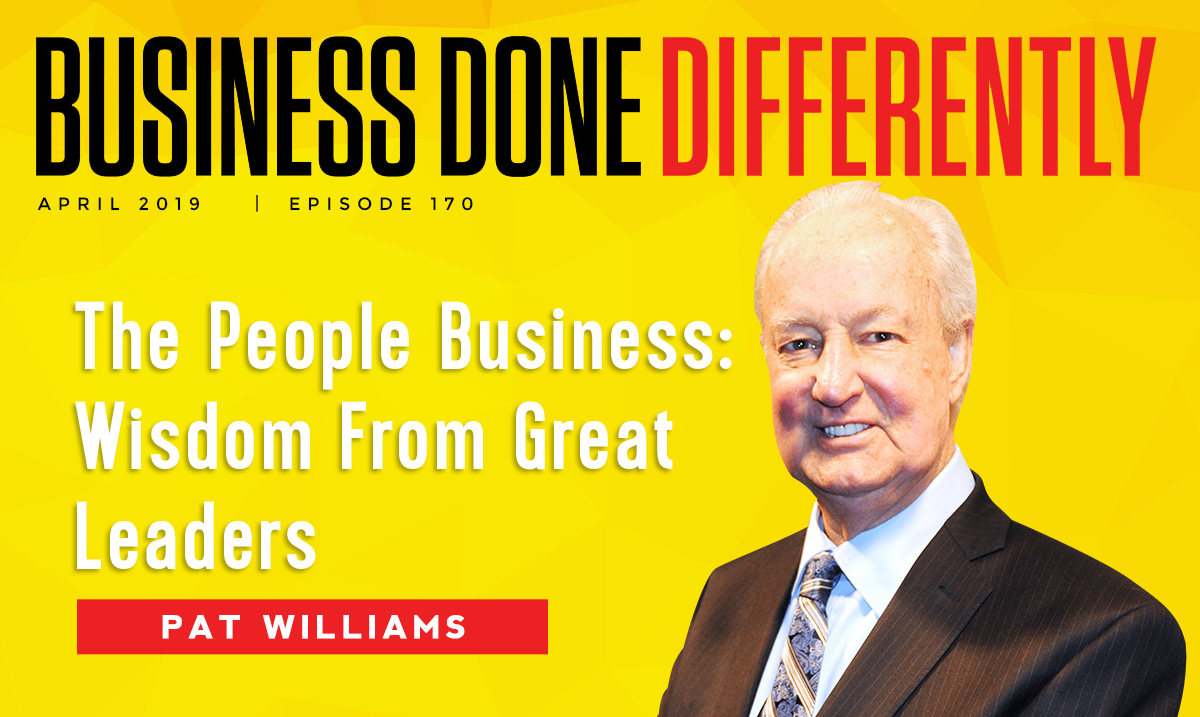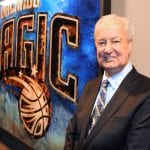The People Business: Wisdom From Great Leaders with Pat Williams | Ep. 170
—
Listen to the podcast here:
[smart_track_player url=”https://businessdonedifferently.podbean.com/mf/play/9k22tx/BDD_170_Pat_Williams.mp3″ title=”The People Business: Wisdom From Great Leaders with Pat Williams | Ep. 170″ artist=”Jesse Cole” image=”https://findyouryellowtux.com/wp-content/uploads/2018/12/jesse_cole.jpg” ]The People Business: Wisdom From Great Leaders with Pat Williams
Our guest is a basketball Hall of Famer, Cofounder of Orlando Magic, author of over 100 books, parent to nineteen children, including fourteen adopted from foreign nations. He served seven years in the United States Army and is now a cancer survivor, an inspiration to me and millions, Pat Williams. Welcome to the show.
Jesse, nice to catch up with you. Thanks for the invite.
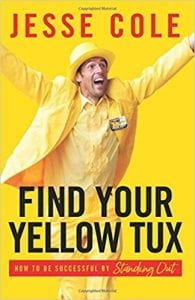
Obviously, we connected a couple of years ago and stayed in touch. I can’t thank you enough for endorsing my book as well, Find Your Yellow Tux. I first got introduced to you, Pat, when I read your amazing book, Marketing Your Dreams. I would like to briefly talk about that in your story to set some context because I was fascinated by Bill Veeck. You wrote a book about how Bill Veeck had an impact on you. Could you put a little context and share your story with our readers?
I don’t know exactly where to begin, but let’s begin it on the Bill Veeck front. In 1962, I was a Minor League ballplayer in the Phillies organization in Miami. We had an off day. I was in downtown Miami. I went to Burdines Department Store up into the book section. They were sitting on one of the tables was a new book just out. It was called Veeck–As In Wreck, a story about baseball’s incorrigible maverick, Bill Veeck. I was a baseball fan of depth and certainly knew who Bill Veeck was. I’d always admired him from afar when I was a boy running Cleveland and then came the Browns and then to the White Sox. I was always fascinated by him.
I bought the book. It was pre-signed by him, $3.95. It’s a thick hardcover book. Those times have changed. I bought the book and read it quickly. It was a fast absorbing read. I had a pen with me. I kept marking different places. I was fascinated by the book. When the season ended in 1962, our general manager there in Miami knew Bill Veeck. He was a friend of his. I asked if I could have my GM there, Bill Durney help me to go visit him. I went back to my home in Wilmington, Delaware. Bill Veeck then was in retirement, living in Easton, Maryland about a two-hour ride from my home.
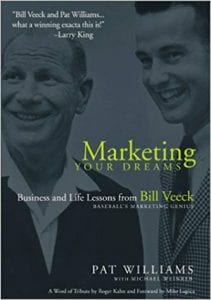
Bill Durney said, “Yes, I’ll set it up for you.” He did. I was able to go in the seatbelt back that September afternoon in 1962. It was a life-changing experience. Bill was so kind, so gracious. I expected maybe a quick handshake and a goodbye, but he invited me for lunch. I must have stayed there the better part of five hours before I left. Little did I realize that five hours was going to be a life changer for me. Bill took an interest in me. I never worked for him. He was always very good to me. He’s very kind, very generous in his wisdom, his offerings and his suggestions. Opening doors for me later on as I moved up the sports ladder. I ended up a few years ago writing that book, Marketing Your Dreams, the life lessons that I learned about sports and life and success from the great Bill Veeck. That’s a brief background there. Bill became a role model for me. My 50 plus years running basketball and baseball teams were modeled after the way Bill Veeck did it.
I loved reading that because I also started in Spartanburg as an intern with the team there. You started in Spartanburg. Obviously, I have a lot of love. Everyone, my readers know Bill Veeck, but you followed in his footsteps with a lot of the unique things that you started doing in the minor leagues. You understood right away that it was about the customer experience. It wasn’t about the baseball game. It was about providing fun. Can you share maybe a few of those things that you did back then or have done to create, things that are a little unique and fun for the fans?
The Phillies sent me to Spartanburg in February of 1965. I was 24 years old and getting that opportunity at a very young age to run my own minor league ball club. We had very supportive ownership, which was great. I took the Veeck philosophy with me, which was to make it fun every night. Do things that are going to appeal to fans, get them talking, get them coming to the ballpark wondering what’s going to go on tonight. That’s the atmosphere we have no control over what happens out on the ball field. Once the game starts, the athletes are going to play. The game is going to take its own course.
Everything else we do from the time our fans come into the ballpark, we do have control over; the cleanliness of your park, the tastiness of your hotdogs, the amount of ice you have in your cold drinks or how your staff greets the fans. Fun, creative things that you’re going to do to make fans come back talking and start spreading the news to their neighbors about, “We got a great experience out there in beautiful Duncan Park.” I’ve taken that philosophy with me through my MBA days, be it Chicago or Atlanta, the years in Philadelphia and certainly here in Orlando for the last 30 years, presenting the games in a way that are exciting and fun for the fans and sends them home talking. That’s really what we’re trying to do.
You and I both have the same thing that we love studying people that have been very successful. You learned a lot from Veeck. I’ve now learned a lot from you. That’s been something that you have continued to become a sponge as you’ve grown. You decided to start following all these amazing people that have done things that are unimaginable. How to Be like Walt, I am a huge Walt Disney fan. You spent a couple of years researching. What were some things that stood out for you because that book has made a bigger impact on me than any book? Can you share a little bit of how that process went?
Jesse, that book came out hard to believe several years ago. It’s still in print. When I came to Orlando many years ago, it didn’t take long to get Disney-ized once you come here to Central Florida. I’ve got very much absorbed with what’s going on out at Disney World. I became particularly fascinated with Walt Disney himself. We took the better part of four years or so to write that book. I was able to get ahold of about every Disney legend who had known him and worked with him way back. I got their stories. I got their input. We wrote this book as a motivational biography. There were other biographies involved. This was a book designed to look at Walt’s life. What can we learn from it?
[bctt tweet=”The most important thing that won’t end is the vision. ” via=”no”]What can we take from his life? I’m glad to hear that the book had value to you. It’s still in print. I still hear from people who have read it and feel that their lives have been impacted. We’ve got another Disney book coming up. We’re writing it now, Jesse. It will be out soon called Lead Like Walt. We’re going to look at Walt Disney through the narrow lens of leadership. When you think about it, he died in December of 1966, a long time ago. Disney World, it’s got an impact around the world. Disney has never been bigger. I think that goes back to Walt Disney, the leader. Many of those organizations collapsed when the top guy dies. In this case, Disney has gotten bigger and stronger and more impactful. That’s a reflection on Walt Disney and how he led. What can we learn from Walt Disney as a leader?
It’s a true test of leadership. Look at all these great companies that are no longer great companies because it didn’t continue on and carry on. You look at like Chick-fil-A after Truett Cathy passed, they’re still going strong and then Disney World. There are not many more. I remember one quote I grabbed from your book, which I loved. It was from Richard Sherman, the composer. He said, “Walt had a way of communicating that was magical. Simple but magical. He would give you a challenge and say, ‘I know you can do this.’ He made you believe anything was possible. He made you proud to be on his team. It was a team effort. Walt would roll up his sleeves and go to work alongside the rest of us. He saw potential in people who never had really done anything great before.” That’s a great level of leadership. As you’re doing research on the new book, what else have you noticed that Walt was able to do to build great leaders and enduring company after he was gone?
The most important thing Walt had was a vision. He had the ability to see way down the road. He saw out in the distance before others. He was able to put shoe leather to that vision and turn that vision into reality. That’s the mark of a great leader. Walt also had the unique ability to communicate his vision. He was a great storyteller. He was a great actor. He could take his dreams and his visions and portray that to his people in a way that got them excited about what he was thinking, what he was working on, got them enthused.
As Richard Sherman pointed out, Walt had great people skills. He was not a warm gushy guy. He was not one to offer verbal praise endlessly. People trusted him. He reached out to his people. He challenged them. He pushed them to live up to their full potential. He saw ingredients in them that they didn’t see in themselves. He would put them to work on something that they never had experience with. He would challenge them and believe in them. That’s why this next book we’re writing, Lead Like Walt, I think is going to be an important addition to the world of Disney books.
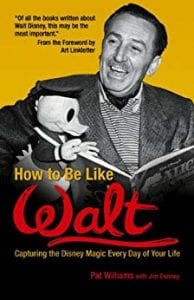
I can talk about Walt for days. I remember the story you shared in How to Be Like Walt about when he was making a pitch to a big corporation to sell advertising on the Thunder Roller Coaster, the big roller coaster. He gave this whole pitch in front of this whole board. They were all excited. They agreed to buy it on the spot. One of the people said, “What did we just buy?” Because they didn’t even know it. We don’t talk about that much with leaders. Leaders that can captivate a group, that can galvanize a group and get them so excited, I want to be a part of it. Pat, you probably realized this too and Walt probably realized it as well, he didn’t know exactly what the future looked like. He had this big audacious vision. He was able to get them so excited to go on that path with them. They didn’t even know where they were going probably.
Walt could sell. He could probably have sold a double bed to the pope. He was a great salesperson with his staff, with television executives, advertisers, associates. He was a wonderful salesperson. He did it with great enthusiasm, great excitement. To be a great leader, you’ve got to sell. Leaders are always selling. Every president of the United States that I’ve ever study was constantly selling, selling his beliefs or selling his approach or whatever. If the president of the United States is the greatest salespeople the world has ever seen, the rest of us as leaders are always selling. Walt was certainly that. We’ll probably do a chapter on Walt’s leadership as a salesman.
Sales probably has some type of negative connotation. We know in sports we’re always selling. With Walt, correct me if I’m wrong, he was sharing his beliefs and emphasizing what he believed in. That’s a different way of looking at sales. If you’re out there sharing what you believe in your truth, that can bring people together. It is selling but you’re forcing someone to buy. You’re forcing someone to become a part of it. I have one question more with Walt. If he was alive right now, Pat, and you could ask Walt one question, what would you ask him?
I’d probably ask him this, “Walt, on your deathbed, you said to your son-in-law, ‘If I could live another twenty years, we would get more done in those twenty years than we have in all the years up to right now.’” I would say, “Walt, what did you mean by that? What would those twenty years have been like if you would live? What was it that was churning inside your brain that you didn’t get to see fulfilled? Tell us about those next twenty years as you envisioned them.” I think that’s what I want to know.
He had so many different visions for EPCOT. All the visions there that never got to come to reality. I want to get into your new book, Character Carved in Stone. You mentioned you’ve researched presidents. You’ve done a lot on John Wooden. Is there anything else that you’re finding this one unifying thing between all successful people that brings them together?
They’re passionate about what they do. They’re excited about what they do. They’ve got great energy for what they’re doing. They’re enthusiastic. I’m sure they have downtimes, discouraging moments. By and large, every successful person that I’ve ever written about or studied had great passion, great feeling and great energy for what they were doing on a daily basis. There would be other common ingredients, but that one is what I’ve noticed with all of them.
[bctt tweet=”To be a great leader, you’ve got to sell.” via=”no”]It’s a passion that leads to energy. Energy leads to getting over adversity and obstacles and keep moving forward. I’m sure every single one you’ve studied, especially Walt, the number of challenges and adversity that he overcame. He was at the bottom for a lot of his life. He had to keep climbing up. Obviously, he had passion and a vision. It’s a great segue into Character Carved in Stone, just released. Tell me a little bit about this book. What inspired you to write it and what’s the big message here?
I was invited to go up to West Point and speak to the athletic teams at Army and the coaches had a wonderful experience doing that. Afterward they gave me a tour of the campus, which was fascinating. Eventually, we ended up over in a little park area called Trophy Point, which looks out over the historic Hudson River. I noticed in this park a bench and then I looked further and there were more benches. I counted them. There were twelve of these benches, concrete benches that were there. As I looked a little bit closer, I noticed that there was a different word carved into the end of each bench. Words like courage, determination, dedication, loyalty, trust, those kinds of words.
I thought to myself, “What’s the story here?” We found out that the West Point Class of 1935 that donated those benches and those words carved in there were there to inspire the students to live by those twelve words as future leaders, military generals and people that would be leading our country. They wanted them to have those twelve words buried deep within them. I came back and talked to the publisher about that. They liked the idea very much. The end result is this book. There’s a chapter on each one of those qualities. We found a West Point graduate who we felt best modeled that particular word. Throughout the book, you will read about Ulysses S. Grant, Dwight D. Eisenhower and Douglas MacArthur. You’ll read about Mike Krzyzewski, a West Point graduate who wrote the foreword for us. You’ll read about General Omar Bradley and others. We had a marvelous time putting it together. It’s a book that can inspire and make a difference in people’s lives. It’s just out, Jesse. It should be getting into bookstores. Amazon is always a good way to order books. It’s a book that I feel may be the most important one we’ve written perhaps. We’ll be getting some early reports in here pretty soon. That’s the name of the book, Character Carved in Stone. Revell is the publisher. Coach K of Duke, was kind enough to write the foreword, which really pleased us.
I’m sitting here like probably many entrepreneurs, business owners, and hearing that, my thought process immediately goes to those are the core beliefs of the group there. They might have something on the wall but how many times are they carved in stone? I think about this from a business standpoint, if you believe in who you are and what you stand for and your core beliefs, how are you willing to put them in stone and make them stand the test of time? That’s a really important takeaway because I’m excited to read the book and hear the stories, but you’ve got to be so committed in your beliefs that in 30, 40 or almost 100 years like this book, that people will still be living by them.
[bctt tweet=”Passion leads to energy, and energy leads to getting over adversity.” via=”no”]Thank you, Jesse. That’s well phrased. Those benches have been out there now for many decades through bitter cold winters and hot, sunny summers. There those benches are. Those words stay engraved. They are compassion, courage, dedication, determination, dignity, discipline, integrity, loyalty, perseverance, responsibility, service and trust. Those are the twelve. Anybody, whether you’re a West Point cadet or a businessman or a coach, whatever field you’re in, those twelve words are a good way to live your life.
What’s interesting too about the words, the words can mean one thing, but it’s the stories that back up the words that mean everything. We take pride in that here. We have our Fans First way in our six core beliefs. Every week, every Friday, we have our team email us, lets us know what was something that they did that was Fans First with our core beliefs and what were the stories that were created. That’s what we share. I wonder if there’s a story that maybe stands out from this book basically sharing one of those powerful beliefs.
The book is filled with stories. You’re going to read a story about Ulysses S. Grant, a West Point grad, and his compassion that might surprise people. You’re going to read about Dwight D. Eisenhower. You’re going to read about General John Pershing, who led our forces in World War I. You’re going to read about Omar Bradley, who was viewed as the soldiers’ general. You’re going to read about Matthew Ridgway, who parachuted on D-Day. He parachuted into France behind enemy lines with his troops. Matthew Ridgway was parachuting in with his troops. I’m still moved by that. He wasn’t back in England getting reports. He was there leading his men, which thrills me when you think about it. Great leaders are out front. They’re visible. They’re available. Great generals were out leading their troops, not leading from behind.

You’ve got to be on the front line. I want to transition a little bit because I think that’s very powerful. I want to go to you and what you have done with your teams. These world-class wows that you talked about in a lot of your speeches. This is Business Done Differently. You’re talking to a guy in a yellow tuxedo that likes to think differently about wowing the fans. What are some things that stand out for you? Maybe some stories, some things that you’ve been blown away by that you have been a part of as far as wowing the fans.
Let me take you back when we started everything up down here while in our 30th season. Two years before that, before we played, we had some big decisions to make here in Orlando. Living in the shadow of Disney World, our fans, people here, were used to the Disney form of entertainment. We felt that if we were not operating at that same level, our fans would probably think, “That’s not up to Disney standards.” At the very beginning, we had some decisions to make. One was, do we want to have a mascot? Back in those days, years back, Benny the Bull was in Chicago. We had designed him when I was there. I don’t think there were any other mascots in basketball. Maybe the 76ers had one that we had designed when I was there.
We made the decision. We were going to create a mascot. We were going to be loyal to him and go with it. We did. That’s how Stuff was created. The next question was, do we want a dance team? Aside from the Laker girls, there were no dance teams in the NBA. Our question was, do we want both? Do we want a mascot and a dance team? That was pretty radical thinking. We debated. We went back and forth. Finally, we said, “Let’s do both.” Nobody had done that. Now we’re making progress. Before our first season started, maybe a month before two guys came knocking on my door. They were a magician group. Their names were Tim and Giovanni. They said, “We have some ideas about bringing sports magic to your games. We want to do it.” We had no idea what they were thinking. They tried to show us.
We made a deal with them. We said, “We’ll give you three or four home games to strut your stuff. We’ll make a decision from there.” I didn’t think a whole lot more about it. They came to the first game. They had thought this through. It was amazing what they had pulled together, backboards with a hoop and a ball that they would throw to fans as they work up into the stands and let fans shoot towards this basket. They flipped up over their back. They came up with these guns shooting t-shirts or things up into the stands, plus any number of other things. It was a huge hit. Unbeknownst to us, sports magic was invented right here in our building. You go to any NBA game now, any college game, they’re all doing what Tim and Giovanni had invented right here in our building. Everywhere you go, you see those antics with the guns and it’s all going off to a much higher level of technology. It all started here. The point I’m making is this, we knew that from the time people came into our building, we had to give them a huge night of entertainment. We had to provide all the sideshows. Everything we could think of that we still do and hope that our team plays a good basketball game.
[bctt tweet=”When you think about it, great leaders are out front. They’re visible and they’re available.” via=”no”]It’s the experience first. You’ve got to focus on the show first sometimes.
From the time they come in our building, an hour before the game, we want them to be thoroughly saturated with what we’re doing. Through the course of the game, we want them absolutely entertained up to the gills. Hopefully, they see good performance. If they don’t, we want them to be thrilled by the skills of NBA players. If our team loses, at least we want them to be excited that they saw James Harden pumping 45 points or they saw the Warriors play unbelievable basketball. Even though they beat us, we want them to go away saying, “That was that sports entertainment at the highest level.” We tried to build a great team. We’re trying to put a championship level team together. In the meantime, as Harry Carey would say, “You can’t be fun at the old ballpark.” We feel that’s very important.
You pioneered some new things obviously, the dance team and the early mascots. We’re trying to do the same with our players who do choreograph dances every game, our breakdancing first base coach, our senior citizen dance team, the Banana Nanas. We’re going to bring on the first male cheerleading team, the Man Nanas. We’re going to have men in pom-poms cheering at our games. It’s going to be a circus. It’s funny. I was thinking there, why don’t regular businesses have mascots? Why don’t they have dance teams? I believe in taking things from the theater, from the cruise ships. Why doesn’t a regular business, if accountants had a mascot that danced, why not? That’s such a big thing to say about being a sponge. I’ve learned a lot about that from you.
I want to go into a little bit about what you do for your employees because I’ll tell you one book that made a real impact on me that I don’t know how much is talked about, but it’s The Difference You Make. That book was unbelievable. There were a few quotes that I absolutely loved, “At some point in your life you must decide whether you want to impress people or influence people. You can impress people from a distance, but you must get close to influence people.” When you talk about wowing your customers, but the difference you make is with the people you’re around every single day, the people you work with. What can you say about how you care about your people, with the Orlando Magic and any of the teams that you’ve been a part of?
[bctt tweet=”Words can mean one thing, but it’s the stories that back them up to really mean everything.” via=”no”]Let’s not ever forget that we are not in the basketball business or the baseball business or the coffee business or any business. We’re in the people business. Our job is to relate to people, to encourage people to build them up. We want people to feel good about themselves. It’s awfully important if people can rub shoulders with the brass, with the president of the team or the president of the company, or feel that they have a personal relationship. They shook hands with the guy. They feel very much part of it. That’s so important. That’s where Bill Veeck was so good. Bill answered his own phone. He opened his own mail. The door to his office was always open. He roamed around his ballpark.
I want to say something to that. I wrote you a letter about the impact your books made on me and all of a sudden, I get a phone call from a number from Orlando. It was you calling me. I’m saying you are living this example. I think so many people, they talk about being there for others and helping others. You called me right out of the blue. We started a conversation, built a relationship, came down and visited you. That is such a testament to who you are. You’re not putting it down in the books. You’re living your true self and believing in being who you should be, which is amazing.
That was all part of Bill Veeck’s approach that rubbed off on me. If you called Bill, he would pick up the phone. If you wanted to come see him, you probably were going to go in and get to see him. In my case, remember I said I wanted to come down to his house and see if I could meet him when I was 22 years old. He told me to come on down. He told me how to get there and then spent five hours with me.
It’s amazing the example he set.
My thinking has been Bill Veeck and others were so kind in how they treated me as a very young guy. I feel I need to return that now that I’m older. There’s a whole army of youngsters coming along that would like to pick my brain. I feel I’ve got a real obligation to do that.
I’m sure you feel as well that you’re still learning. That’s the key. The greatest leaders are still constantly learning. I bet you learn when you’re talking to younger people like I learn when I’m talking to people in college.
John F. Kennedy years ago said, “Learning and leadership are indispensable to each other.” I believe when we stop learning, we begin to die. Therefore, I’m reading more voraciously now than ever before. That was another Bill Veeck lesson. He was not a college graduate, but he was probably the best-educated sports executive ever because he had a great hunger for books. Nothing thrilled him more than to go into a bookstore back in the day and come out of it with eight or ten new books that he wanted. He would absorb them pretty quickly. Those books probably cost $3.95 or $5. Now they cost $30. He thrived reading. I challenge people constantly. What are you reading? What’s your book this week? What are you learning from it? What’s your next book?
I joke that Amazon knows me better than my wife because I’m ordering so many books. We have a better book club here in our office. Something maybe with the Orlando Magic, we pay all of our people to read. Everyone in our company gets $50, $75. We paid off thousands of dollars for people to read. It’s been an unbelievable experience because we’re teaching them and obviously learned it from Bill Veeck. He had six books in the hospital bed when he died. Before I get to some rapid-fire here, I’m going to flip the script, Pat. I’ve been the host grilling you with questions. You are now the host of Business Done Differently, you can ask me one question.
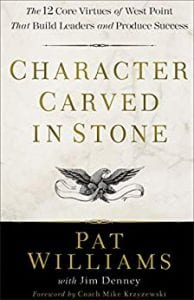
Jesse, I’m not going to do that. I’m going to tell you about my latest book and why it’s important to get Character Carved in Stone. It’s in bookstores now. It’s going to make a difference in your life. Jesse, I’m going to ask you this question. What are your big goals? What are your big dreams? What do you want to be doing ten years from now with your life? Where do you want to be?
As I shared years ago, it hasn’t changed. We want to impact the greatest number of people and how we believe we can do that, which may go against some of the thoughts of a lot of people. The big dragon we’re trying to slay is to change the game of baseball. Unfortunately, what we’ve seen with the numbers and the attendance in Little League participation declining, we want to get kids back involved in the game. We want to make it faster, more exciting. Our big goal is to do that so we can make a bigger impact on millions. Me, similar to you, I’d love to have a similar path where I’m an author, speaker onstage, inspiring people to be the best version of themselves. I hope I can have a similar impact on the millions of people like you’ve been inspired. Thank you. I thought you’ll be the first person ever to not ask a question. I was blown away.
Jesse, I love your imagination. I love your creativity. Bill Veeck would be absolutely thrilled with you. I will tell you that. Have you gotten to know his son, Mike?
We’ve got to know each other well. When I was 23 years old, you similar, went to Bill Veeck. I went to Mike and Mike turned to me and said, “Jesse, you’ve got to be the face of the team and you’ve got to get a little crazy.” Since that point, over a decade I’ve been doing that. I’ve learned a lot and it’s been amazing. I want to finish with a few couple of questions, rapid fire. What’s one thing that you’ve done to stand out in business or in life?
I learned to be a good public speaker. I take seriously the importance of being able to share your message in front of a group, fight through the fear of public speaking and then make a decision to work at becoming good at it. Develop your speaking skills, it’s vital. Make sure you have got a strong message, well-organized, buffed and polished. When you leave a group and they say, “That organization sounds so wonderful because of the way that guy or that lady presented it. He was so articulate and so entertaining and filled with such wisdom. We want to go out and see those Savannah Bananas.” I think that’s what I would challenge every business leader in every field to work hard at being an effective public speaker.
If you were to give advice to your younger self, what would you tell yourself to do differently?
[bctt tweet=”At some point in your life, you must decide whether you want to impress people or influence people.” via=”no”]I would probably tell myself differently to start reading seriously. I’ve always been a reader but I’m saying to be well-read. The greatest compliment you can pay anybody is to say, “He is well read,” or “She is widely read.” I wish I had started doing that in my twenties. I didn’t become intensely serious about reading until I was much older. I would have pushed much harder in that whole area of reading when I was younger.
You’ve been influenced by so many great leaders, but if you were to say what’s some of the best advice you’ve ever received? What would it be?
When your greatest challenge intersects with your strongest passion, you have then found your sweet spot in life right there at that intersection. That’s where you want to live. That’s where you want to work. That’s where you want to get paid every two weeks, right there at that intersection of your greatest talent and your greatest passion. That’s the best advice I can give to any person, particularly young people wanting to know what should I do with my life? I say to them, “What’s your talent? What’s your passion? That’s where you want to live right there.”
Another one of your top books, what was the title of that one?
The Success Intersection is that book. It seems to be re-released in paperback. That’s probably the greatest secret of success I could pass on to anybody.
Finally, how do you want to be remembered?
I want to be remembered as a difference maker. God had a plan and purpose for my life and I tried to live out that plan and purpose. In the process, sharing my skills and my beliefs with as many people as I can. To be remembered as a man that made a difference in people’s lives, made a difference in my family’s lives and had an important impact in this society. That would be a good way to be remembered.
You’ve made a huge difference in my life. I know many more. You shared a story when you were a kid. One of your bosses said how proud he was of you. It might be weird for someone younger to say that, but I am unbelievably proud of what you’ve done as a person, 100 books, the impact you’ve made. It’s much more than you even know. I am humbled to be with you, talking again, learning from you. Thank you for everything you’ve done. The new book, Character Carved in Stone, is out now. Another one coming soon, Lead Like Walt. Thank you so much. Any final words?
I’m very pleased that you’re doing so well. You’ve got a creative mind. Keep feeding it. Creativity and imagination can grow. It can expand. There’s no limit to what you can do when you start thinking creatively. We’re following what you’re doing there with great interest. You got the baseball and we’re looking at you. They’re saying, “Who is this guy down in Savannah?” Bobby was the manager of the Savannah Sand Gnats years ago, which was Nationals Farm Club. I must have gone up there to see six or seven weekends. If they had 100, 150 people in the ballpark, it was a good night for them. The ballpark needed work and so forth. I had a blah evening. To find out what you’re doing outside the realms of organized baseball, it’s fascinating. I look forward to being there one night when your Bananas take the field. That’ll be fun.
We’d love to have you. It’s the lessons from you and Veeck and all the people that we’ve been able to put into play and more than anything, have fun. We like to have fun. That’s what it’s all about. Thank you again.
Thank you, Jesse. As Mike Veeck reminds us, fun is good. I’m glad you believe that, Jesse.
Pat, you’re a rockstar. Thank you so much.
All the best to you.
Keep in touch. Seriously, I know it’s a challenge but we would love to have you in Savannah. It would be an honor.
Jesse, that sounds great. I hope I can do it.
Thank you so much, Pat. Take care.
Important Links:
- Pat Williams
- Find Your Yellow Tux
- Marketing Your Dreams
- Veeck–As In Wreck
- How to Be like Walt
- Character Carved in Stone
- The Difference You Make
- The Success Intersection
About Pat Williams
Pat Williams is a basketball Hall-of-Famer, currently serving as co-founder and senior vice president of the NBA’s Orlando Magic. Also one of America’s top motivational and inspirational corporate speakers, Pat has addressed employees from many of the Fortune 500 companies. Pat is also the author of over 100 books, his most recent title highlighting the leadership secrets of the United States Military Academy at West Point in CHARACTER CARVED IN STONE.
Pat has been the general manager with NBA teams in Chicago, Atlanta, Philadelphia and Orlando, including the 1983 World Champion 76ers. In 1996, Pat was named as one of the 50 most influential people in NBA history. In 2012, Pat received the John W. Bunn Lifetime Achievement Award from the Naismith Memorial Basketball Hall of Fame.
Pat was diagnosed in February of 2011 with Multiple Myeloma, an incurable form of cancer. However, after several rounds of chemo, Pat’s doctors have told him that they are unable to detect any myeloma in his body and have given him a clean bill of health.
Pat and his wife, Ruth, are the parents of 19 children, including 14 adopted from four nations. Additionally, Pat has been blessed with 17 grandchildren. Pat and his family have been featured on CBS This Morning, Good Morning America, Fox & Friends, and Mike and Mike as well as in such diverse publications as Sports Illustrated, Reader’s Digest, Good Housekeeping, The Wall Street Journal, and Focus on the Family.
Love the show? Subscribe, rate, review, and share!

